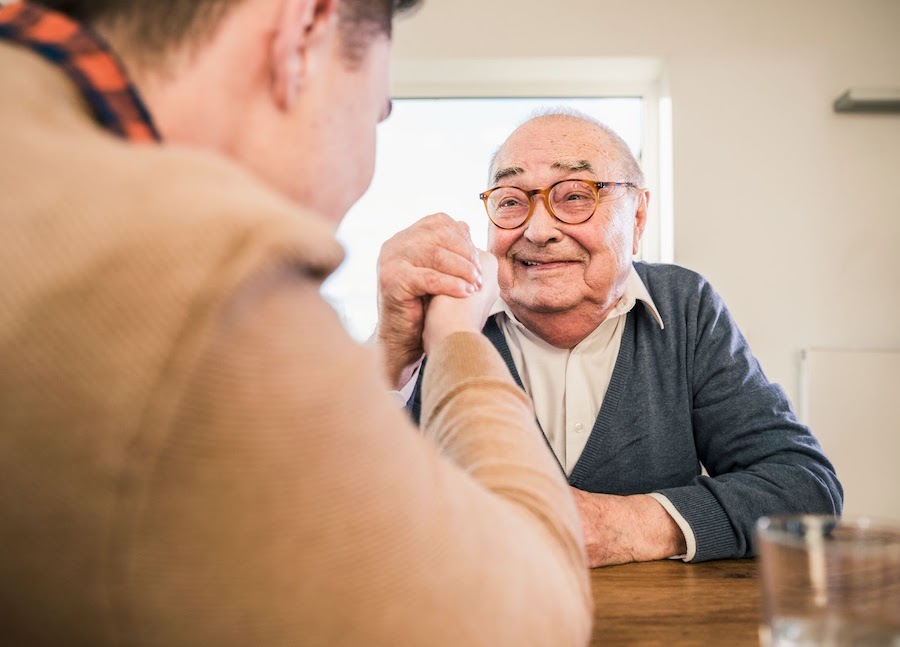Dying is a natural part of life, and every person deserves respect and dignity during the process. But even though it’s a natural process, it can be very challenging to have conversations about the end of life. This is especially true when you’re having this discussion with a loved one. The hospice journey is a deeply personal experience filled with emotions and unknowns. But having open, honest discussions about end-of-life care can actually benefit everyone involved. These conversations make sure a person’s wishes are both known and respected. Candid discussions can help loved ones feel prepared for the upcoming journey — and also provide a sense of closure for patients and families.
We understand how sensitive end-of-life discussions can be, and we know the courage and vulnerability it takes to broach the topic! Here at Envision Hospice, we’re committed to supporting open and honest communication between patients, families, and your care team. If it’s time for a discussion about hospice, we’re here to help with some of our best conversation starters to bring up the subject.

Starting the Conversation: Practical Tips
Starting an end-of-life conversation can sometimes feel a little awkward. To ease into the discussion, you might consider starting with less direct questions that can lead to deeper conversations.
For instance:
- How do you feel about the medical care you’re currently receiving?
- Are there any aspects of your health that you’re concerned about?
- What are some things that bring you joy and comfort in your day-to-day life?
- What are some meaningful life lessons or experiences you’d like others to understand?
These conversations don’t have to happen all at once. Discussions about end-of-life care often unfold gradually and naturally over time.
When someone takes the initiative to start the discussion, patients and families can reflect and consider their feelings and values. Our hospice team can help families feel more comfortable asking important questions.
Key Topics To Address in End-Of-Life Discussions
End-of-life discussions can cover a wide range of topics. It’s important to talk through subjects like medical care preferences (such as life-sustaining measures and the patient’s thoughts about curative treatments). The best conversation starters also touch on emotional and spiritual care, like how the patient wants to be supported emotionally and spiritually, and what brings them comfort and peace. We believe that a person’s end-of-life care should always be patient-centered and aligned with their individual values and beliefs.
Here are some possible questions to discuss:
- Are there specific conditions under which you’d want to avoid certain medical procedures?
- What does comfort and quality of life mean to you?
- How can we best support you emotionally during this time? Are there specific things you would like us to do or say?
- In what ways can we honor your values and beliefs as we discuss and plan your care?
- Are there specific people you want to see or talk to during this time?
- What kind of spiritual or religious practices are important to you right now?
- Is there anything that is worrying you that we can address together?
These questions can help open up a dialogue that respects the patient’s autonomy and makes sure their care aligns with their values and preferences.

The Best Conversation Starters: How Your Hospice Partner Can Support End-of-Life Discussions
Professional support is such an important resource when a family walks through the complexities of end-of-life planning. Your hospice care team (including physicians, nurses, social workers, and spiritual care coordinators) is trained to address a full spectrum of needs. This team can facilitate family meetings, making sure that everyone’s voice is heard and that the individual’s wishes, comfort, and dignity remain at the center of care. Our professionals can also help navigate the practical aspects, such as understanding healthcare options, managing symptoms, and coordinating with other care providers.
A quality hospice partner’s support goes beyond medical needs. We’re here to ease a patient’s physical, emotional, and spiritual pain — AND support their family. Hospice can take place in your home, at a nursing home, or at an assisted living facility. We’ll work with your circumstances to provide the care your loved one needs. It’s important that a patient is surrounded by the people and things they love during their hospice experience.
An Ongoing Conversation
Typically, hospice care is an option for patients with a life expectancy of six months or less. As individuals’ health situations change, end-of-life preferences and needs may change as well. It’s vital that discussions about pain management, integrative therapies, and comfort continue throughout the process. Here are some of our best conversation starters to ensure a patient’s care plan stays aligned with the individual’s current wishes:

- How are you feeling about your current level of comfort, and is there anything you’d like us to do differently?
- Are there any pain management techniques or therapies that you’ve heard about and are interested in trying?
- What daily activities are most important to you that we should try to maintain for as long as possible?
- Are there any personal goals or events you’re looking forward to that we should consider in your care planning?
Our team is committed to updating documentation and care plans as needs change. We encourage families to speak openly with care providers to promptly address any changes or concerns.
The Best Conversation Starters for Exploring Hospice Care
At Envision Hospice, we’re committed to ensuring a peaceful and dignified end-of-life experience for each individual we serve. Our holistic approach to care supports not only the physical needs but also the emotional and spiritual well-being of individuals and their families. Through thoughtful conversations, personalized care plans, and a compassionate team, we help navigate the complexities of end-of-life care, ensuring that each individual’s journey is honored and cherished.

